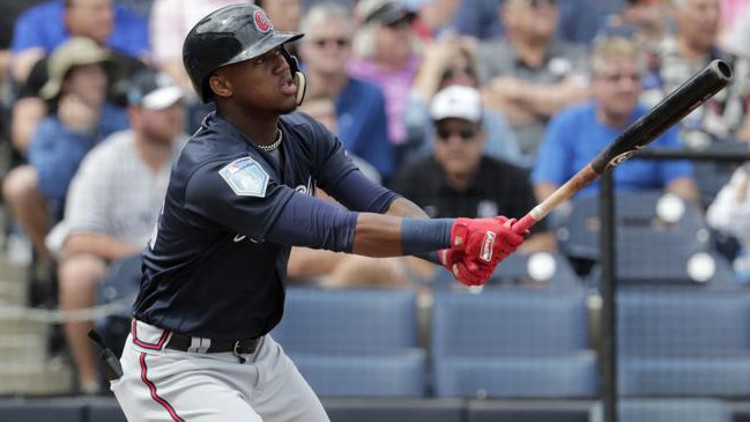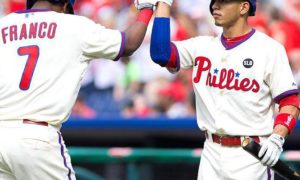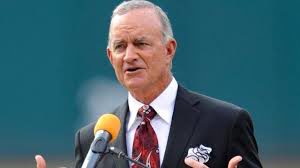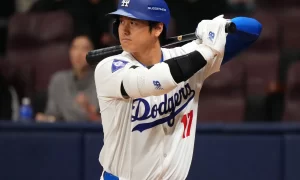Who Benefits From Keeping Ronald Acuna Down?

On March 19, the Atlanta Braves sent 20-year-old megaprospect Ronald Acuna to their minor league facility. The phenom slashed .325/.374/.522 across three levels of the minors in 2017, became the youngest player ever to win the Arizona Fall League MVP, ranked either #1 or #2 on every major preseason prospect list, and posted a 1.247 OPS in Spring Training. Quite simply, he’s an absolute monster, and he’s 100% ready to unleash fury on the National League.
His demotion is a transparent manipulation of service time. By spending a few weeks in the minors to start the season, the Braves delay his free agency by a full year and gain a 7th season of team control. Like it or not, this is standard operating procedure with top prospects for every franchise, most notably with Kris Bryant in 2015.
However, gaming the system to keep Acuna locked up through 2024 is not guaranteed to work. There are three major assumptions that all have to go according to plan:
- Acuna has to be good. It seems impossible, but he could turn into a bust. Sometimes baseball’s best prospect becomes Alex Rodriguez, but other times it’s Jurickson Profar. Before the 2012 season, Matt Moore ranked #1 on the MLB.com and Baseball Prospectus lists, just ahead of Bryce Harper and Mike Trout. Acuna has all the makings of a star, but you just never know.
- The Braves and Acuna must fail to agree on a long term extension. Lots of young stars sign extensions that eat up their arbitration years and the first few years of free agency. Trout, Jose Altuve, and Acuna’s future teammate Freddie Freeman are just a few of the players who signed early extensions. This renders service time considerations moot. If Acuna signs an extension before free agency, spending this April in the minors will seem pointless in hindsight.
- The Braves decision makers need to stick around long enough to reap the rewards. This is where things get complicated. No one keeps a job forever, especially in baseball. The brass who sent Acuna to the minors are gambling that they’ll still be with the franchise in seven years. Otherwise they’re just helping the people that will eventually take their jobs.
Who will actually be around long enough to benefit from the Acuna demotion? Let’s take a look at the powers-that-be and determine how likely they are to outlast him in Atlanta.
Manager Brian Snitker: Probably Not
Brian Snitker is a Braves lifer. He was drafted by Atlanta in 1977, became a minor league coach after his playing career ended in 1980, and has held several coaching and managerial roles throughout the organization ever since. He took over as manager of the big league club in May, 2016 at age 60, accruing a 131-155 record to date.
There have been 699 major league managers in baseball history. Their careers have spanned as many as 7,755 games (Connie Mack) or as few as one (14 different “managers”). The average managerial career lasts 617 games, which is about 3.8 seasons. Modern managers are quite a bit more stable though. The 30 managers who finished the 2017 season averaged 1350 games, or 8.3 seasons on the job.
However, there are a few caveats to that. Some managers compiled experience with previous franchises, such as Terry Francona in Boston or Bud Black in San Diego, and 6 of them have since been fired. Including recent hires, the average manager has spent 585 games (3.6 seasons) with their current organization. Excluding the 6 newbies, the 24 returning managers average 731 games (4.5 seasons) in their dugout.
If Acuna had come up in 2011, his “extra” year of service time would’ve been 2017. Only Bruce Bochy (Giants), Clint Hurdle (Pirates), Mike Scioscia (Angels), Buck Showalter (Orioles), and Ned Yost (Royals) have held their manager jobs since at least 2011.* In 25/30 franchises, an Acuna-level talent would’ve played for at least two different managers before hitting free agency.
Snitker already has almost two years at the helm. Seven more seasons would put him in rarified air, especially considering his age (he will be 68 in 2024) and given that the front office that promoted him is no longer in power. It seems highly unlikely he’ll be the manager to waive goodbye to Acuna as he becomes a free agent.
General Manager Alex Anthopolous: Maybe
Major League Baseball forced the Braves to clean out their front office amid scandal last year, and former Blue Jays GM Alex Anthopolous was granted the keys to the franchise. He officially took over as the Braves GM on November 13, 2017.
Sometimes it’s hard to tell exactly who’s running each baseball team. It could be a GM, a president of baseball operations, an overactive owner, or possibly some otherly titled figure. These people sometimes work their way up from internships or come as outside hires. As near as I can figure, the men pulling the strings behind each team have an average 2011 start date in the top job. In other words, they have exactly seven years average experience.
Of course, Anthopolous has zero experience with the Braves, so he’s starting from scratch. If he lasts as long as the average GM, his departure might coincide with Acuna’s in 2024. Maybe they can sign a package deal as free agents! Wouldn’t that be adorable?
Owner (Faceless Corporation): Probably?
The one person who can’t be fired in any organization is the owner. Unsurprisingly, they tend to stick around for quite a while. The Marlins turned over most recently just a few months ago, but some have controlled their franchise since as long ago as 1980 (Fred Wilpon’s Mets) or 1981 (Jerry Reinsdorf’s White Sox). This doesn’t even include owners who inherited the team from their parents, such as the Steinbrenners (Yankees), Ilitchs (Tigers), and Pohlads (Twins). On average, the current MLB owners have more than 14 seasons at the top of the food chain, and the average team last changed hands in 2003.
Ted Turner sold the Braves to the Liberty Media Corporation in 2007. It’s impossible to tell if they’ll still be around to sign Acuna’s last paycheck with the team. But this is about people. Liberty Media isn’t exactly a person like Peter Angelos or David Glass. The chairman is John C. Malone. Even if Liberty still controls the Braves through 2024, will he still be the one in charge? Is he even the one in charge of baseball right now?
Ironically, the person most likely to benefit from keeping Acuna doesn’t even have a face to put with the name.
Players: HAHAHAHAHA! Seriously, No.
Never mind how service time manipulation decreases the long-term earnings for a member of the MLBPA collective bargaining unit. Perhaps that’s a topic for another day. Are there any current Braves players who will stick around longer than Acuna?
Only two current Braves have played for the team since 2011: Freddie Freeman and Julio Teheran. After debuting the year before, Freeman was the Rookie of the Year runner-up as a 21-year-old in 2011. Teheran, age 20, only threw 19.2 IP for the big league club that year and wasn’t a full-time major leaguer until 2013. If these two are any indication, maybe one or two current players on the Braves might remain teammates with Acuna through his seventh year in Atlanta.
Who might that be? Freeman is signed through 2021 and Teheran through 2020. Both will still be in their nominal prime years (age 31 and 29), so they could sign another extension. More likely, a fellow youngster may accompany Acuna through his arbitration years, such as Dansby Swanson, Luiz Gohara, or Ozzie Albies. However, that would require these players to either sign an extension of their own or suffer similar service time shenanigans.
Anyone else?
It’s hard to say exactly who benefits from an additional year of Acuna in Atlanta. In no way does Acuna himself gain any advantage from delaying his MLB debut and subsequent free agency. What about Braves fans? That’s another complex discussion. Yes, it’s good to have him around a little longer, but no, it’s not good that the best organizational strategy is leaving a mostly developed potential superstar in the minors. More likely than not, the people who benefit the most aren’t even Braves employees yet, or at least they’re lower on the chain of command than the people calling the shots right now.
*Bob Melvin became the A’s manager on June 9, 2011, so he wasn’t there for the start of the season.




















